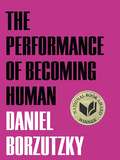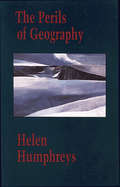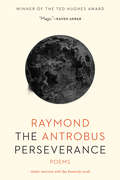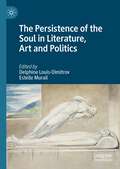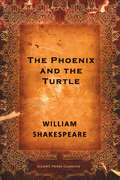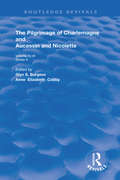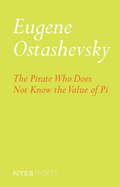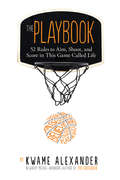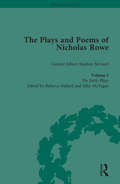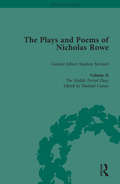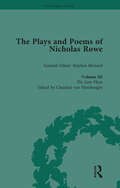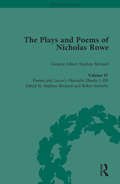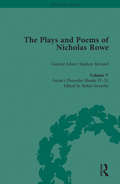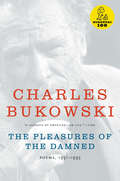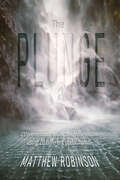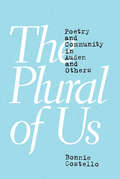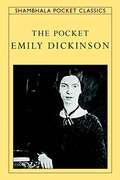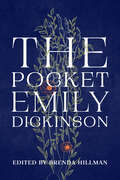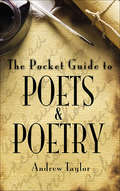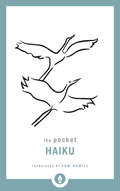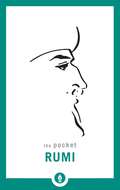- Table View
- List View
The Performance Of Becoming Human
by Daniel BorzutzkyFollowing in the path of his acclaimed collections THE BOOK OF INTERFERING BODIES (Nightboat, 2011) and IN THE MURMURS OF THE ROTTEN CARCASS ECONOMY (Nightboat, 2015), Daniel Borzutzky returns to confront the various ways nation-states and their bureaucracies absorb and destroy communities and economies. <P><P> In THE PERFORMANCE OF BECOMING HUMAN, the bay of Valparaiso merges into the western shore of Lake Michigan, where Borzutzky continues his poetic investigation into the political and economic violence shared by Chicago and Chile, two places integral to his personal formation. To become human is to navigate borders, including the fuzzy borders of institutions, the economies of privatization, overdevelopment, and underdevelopment, under which humans endure state-sanctioned and systemic abuses in cities, villages, deserts. <P> National Book Award Winner
The Perils of Geography
by Helen HumphreysIn her third book of poetry The Perils of Geography, Helen Humphreys charts a world that opens under the prodding and promise of language. With the wit and eye for evocative detail which gained readers for both Gods and Other Mortals and Nuns Looking Anxious, Listening to Radios, Humphreys probes the immediacy of now, the intensity of this, the residue of then. Don’t be deceived by the spare appearance; her poems are resonant and full, "all angles and confidence." Light falls slant across them. She maps "what surrounds not what's made still" -- "the moving line." The line she traces connects the pull of memory and moment, open roads and winter aconite, transcendental basements and ornamental shrubbery. In "Singing to the Bees," the ten poem sequence which makes up the second of three sections in Perils, she slips inside folk wisdoms, wears them with an easy grace, all flesh and wit and possibility: dancing shoes, gifted pigs, swarming bees, airplane nuns and spectre ships. These poems make superstition delicious.
The Perseverance
by Raymond AntrobusFeatured on NPR's Morning Edition <P><P>A Poetry Book of the Year at The Guardian, The Sunday Times, and Poetry School <P><P>Winner of the Ted Hughes Award, Rathbones Folio Prize, and Somerset Maugham Award; shortlisted for the Griffin Poetry Prize <P><P>In the wake of his father’s death, the speaker in Raymond Antrobus’ The Perseverance travels to Barcelona. In Gaudi’s Cathedral, he meditates on the idea of silence and sound, wondering whether acoustics really can bring us closer to God. Receiving information through his hearing aid technology, he considers how deaf people are included in this idea. “Even though,” he says, “I have not heard / the golden decibel of angels, / I have been living in a noiseless / palace where the doorbell is pulsating / light and I am able to answer.” <P><P>The Perseverance is a collection of poems examining a d/Deaf experience alongside meditations on loss, grief, education, and language, both spoken and signed. It is a book about communication and connection, about cultural inheritance, about identity in a hearing world that takes everything for granted, about the dangers we may find (both individually and as a society) if we fail to understand each other.
The Persistence of the Soul in Literature, Art and Politics
by Estelle Murail Delphine Louis-DimitrovThis book analyses the evolution of literary and artistic representations of the soul, exploring its development through different time periods. The volume combines literary, aesthetic, ethical, and political considerations of the soul in texts and works of art from the seventeenth to the twenty-first centuries, spanning cultures and schools of thought. Drawing on philosophical, religious and psychological theories of the soul, it emphasizes the far-reaching and enduring epistemological function of the concept in literature, art and politics. The authors argue that the concept of the soul has shaped the understanding of human life and persistently irrigated cultural productions. They show how the concept of soul was explored and redefined by writers and artists, remaining relevant even as it became removed from its ancient or Christian origins.
The Pet Vet
by Marcia LeonardI am Bret. I am a vet. I can help you with your pet. Is your tan cat sick and hot? I will fix it with a shot.
The Phoenix and the Turtle
by William ShakespeareShakespeare's telling of the funeral arrangements for the Phoenix and the Turtledove embodies the depth of their love and the tragedy of their deaths.
The Pilgrimage of Charlemagne and Aucassin and Nicolette (Routledge Revivals)
by Glyn S. Burgess Anne Elizabeth CobbyOriginally compiled and published in 1988, this volume contains the text and translation of 'The Pilgrimmage of Charlemagne' and 'Aucassin and Nicolette,' alongisde textual notes and a bibliography for both.
The Pill Versus The Springhill Mine Disaster
by Richard BrautiganSelected poems of Brautigan from 1957-1968
The Pirate Who Does Not Know the Value of Pi
by Eugene OstashevskyAn original collection from one of the most active poets in contemporary literature.The Pirate Who Does Not Know the Value of Pi is a poem-novel about the relationship between a pirate and a parrot who, after capturing a certain quantity of prizes, are shipwrecked on a deserted island, where they proceed to discuss whether they would have been able to communicate with people indigenous to the island, had there been any. Characterized by multilingual punning, humor puerile and set-theoretical, philosophical irony and narrative handicaps, Eugene Ostashevsky’s new large-scale project draws on sources as various as early modern texts about pirates and animal intelligence, old-school hip-hop, and game theory to pursue the themes of emigration, incomprehension, untranslatability, and the otherness of others.
The Playbook: 52 Rules to Aim, Shoot, and Score in This Game Called Life
by Kwame Alexander Mr Thai Neave<P>You gotta know the rules to play the game. <br> Ball is life. <br>Take it to the hoop. <br>Soar. <P>What can we imagine for our lives?<br> What if we were the star players, moving and grooving through the game of life? <br>What if we had our own rules of the game to help us get what we want, what we aspire to, what will enrich our lives? <P>Illustrated with photographs by Thai Neave, The Playbook is intended to provide inspiration on the court of life. Each rule contains wisdom from inspiring athletes and role models such as Nelson Mandela, Serena Williams, LeBron James, Carli Lloyd, Steph Curry and Michelle Obama. <P>Kwame Alexander also provides his own poetic and uplifting words, as he shares stories of overcoming obstacles and winning games in this motivational and inspirational book just right for graduates of any age and anyone needing a little encouragement. <P><b>A New York Times Bestseller</b>
The Plays and Poems of Nicholas Rowe, Volume I: The Early Plays (The Pickering Masters)
by Rebecca Bullard Stephen Bernard John McTagueNicholas Rowe was the first Poet Laureate of the Georgian era. A fascinating and important yet largely overlooked figure in eighteenth-century literature, he is the ‘lost Augustan’. His plays are important both for the way they address the political and social concerns of the day and for reflecting a period in which the theatre was in crisis. This edition sets out to demonstrate Rowe’s mastery of the early eighteenth century theatre, especially his providing significant roles for women, and examines the political and historical stances of his plays. It also highlights his work as a translator, which was both innovative and deeply in tune with current practices as exemplified by John Dryden and Alexander Pope. This is the first scholarly edition of all Rowe’s plays and poems and is accompanied by 15 musical scores and 31 black and white illustrations. In this first volume, a general introduction by Stephen Bernard and Michael Caines introduces Rowe's works and the five volumes that comprise this set. It then presents the early plays, The Ambitious Step-Mother, Tamerlane, and The Fair Penitent along with a newly written explanatory introduction by Rebecca Bullard and John McTague which precedes the full edited text. Appendices covering dedications performance history, the related music and textual apparatus are also included. A consolidated bibliography is included with the final volume for ease of reference.
The Plays and Poems of Nicholas Rowe, Volume II: The Middle Period Plays (The Pickering Masters)
by Michael CainesNicholas Rowe was the first Poet Laureate of the Georgian era. A fascinating and important yet largely overlooked figure in eighteenth-century literature, he is the ‘lost Augustan’. His plays are important both for the way they address the political and social concerns of the day and for reflecting a period in which the theatre was in crisis. This edition sets out to demonstrate Rowe’s mastery of the early eighteenth century theatre, especially his providing significant roles for women, and examines the political and historical stances of his plays. It also highlights his work as a translator, which was both innovative and deeply in tune with current practices as exemplified by John Dryden and Alexander Pope. This is the first scholarly edition of all Rowe’s plays and poems and is accompanied by 15 musical scores and 31 black and white illustrations. In this second volume the middle plays, The Biter, Ulysses, and The Royal Convert are presented, along with a newly written explanatory introduction by Michael Caines which precedes the full edited text. Appendices covering dedications, prologues and epilogues, performance history, the related music and textual apparatus are also included. A consolidated bibliography is included with the final volume for ease of reference.
The Plays and Poems of Nicholas Rowe, Volume III: The Late Plays (The Pickering Masters)
by Stephen Bernard Claudine Van HensbergenNicholas Rowe was the first Poet Laureate of the Georgian era. A fascinating and important yet largely overlooked figure in eighteenth-century literature, he is the ‘lost Augustan’. His plays are important both for the way they address the political and social concerns of the day and for reflecting a period in which the theatre was in crisis. This edition sets out to demonstrate Rowe’s mastery of the early eighteenth century theatre, especially his providing significant roles for women, and examines the political and historical stances of his plays. It also highlights his work as a translator, which was both innovative and deeply in tune with current practices as exemplified by John Dryden and Alexander Pope. This is the first scholarly edition of all Rowe’s plays and poems and is accompanied by 15 musical scores and 31 black and white illustrations. In this third volume the late plays, The Tragedy of Jane Shore and The Tragedy of the Lady Jane Grey are presented, along with a newly written explanatory introduction by Claudine van Hensbergen which precedes the full edited text. Appendices covering performance history, the related music and textual apparatus are also included. A consolidated bibliography is included with the final volume for ease of reference.
The Plays and Poems of Nicholas Rowe, Volume IV: Poems and Lucan’s Pharsalia (Books I-III) (The Pickering Masters)
by Robin Sowerby Stephen BernardNicholas Rowe was the first Poet Laureate of the Georgian era. A fascinating and important yet largely overlooked figure in eighteenth-century literature, he is the ‘lost Augustan’. His plays are important both for the way they address the political and social concerns of the day and for reflecting a period in which the theatre was in crisis. This edition sets out to demonstrate Rowe’s mastery of the early eighteenth century theatre, especially his providing significant roles for women, and examines the political and historical stances of his plays. It also highlights his work as a translator, which was both innovative and deeply in tune with current practices as exemplified by John Dryden and Alexander Pope. This is the first scholarly edition of all Rowe’s plays and poems and is accompanied by 15 musical scores and 31 black and white illustrations. In this fourth volume his poetry and the first part of his translation of Lucan's Pharsalia, described by Samuel Johnson as one of the greatest productions in English poetry, is presented. A newly written explanatory introduction by Stephen Bernard to the poems, and by Robin Sowerby to the Pharsalia, precedes each of full edited texts. The second part of the text and textual apparatus are included with the fifth volume of this edition. A consolidated bibliography is also included with the final volume for ease of reference.
The Plays and Poems of Nicholas Rowe, Volume V: Lucan’s Pharsalia (Books IV-X) (The Pickering Masters)
by Lucan’s PharsaliaNicholas Rowe was the first Poet Laureate of the Georgian era. A fascinating and important yet largely overlooked figure in eighteenth-century literature, he is the ‘lost Augustan’. His plays are important both for the way they address the political and social concerns of the day and for reflecting a period in which the theatre was in crisis. This edition sets out to demonstrate Rowe’s mastery of the early eighteenth century theatre, especially his providing significant roles for women, and examines the political and historical stances of his plays. It also highlights his work as a translator, which was both innovative and deeply in tune with current practices as exemplified by John Dryden and Alexander Pope. This is the first scholarly edition of all Rowe’s plays and poems and is accompanied by 15 musical scores and 31 black and white illustrations. In this final volume the second part of his translation of Lucan’s Pharsalia, described by Samuel Johnson as one of the greatest productions in English poetry, is presented along with some his own original poetry. A newly written explanatory introduction to the Pharsalia by Stephen Bernard precedes the full edited text in volume IV. Appendices covering the related music and textual apparatus are also included. The edition comes with a consolidated bibliography for ease of reference.
The Pleasures of the Damned: Poems, 1951-1993
by Charles BukowskiTo his legions of fans, Charles Bukowski was--and remains--the quintessential counterculture icon. A hard-drinking wild man of literature and a stubborn outsider to the poetry world, he wrote unflinchingly about booze, work, and women, in raw, street-tough poems whose truth has struck a chord with generations of readers.Edited by John Martin, the legendary publisher of Black Sparrow Press and a close friend of Bukowski's, The Pleasures of the Damned is a selection of the best works from Bukowski's long poetic career, including the last of his never-before-collected poems. Celebrating the full range of the poet's extraordinary and surprising sensibility, and his uncompromising linguistic brilliance, these poems cover a rich lifetime of experiences and speak to Bukowski's "immense intelligence, the caring heart that saw through the sham of our pretenses and had pity on our human condition" (New York Quarterly). The Pleasures of the Damned is an astonishing poetic treasure trove, essential reading for both longtime fans and those just discovering this unique and legendary American voice.
The Plunge: 120 poems about nature, love, loss, and life, using 28 different poetic forms
by Matthew RobinsonMatthew Robinson’s collection The Plunge features 120 poems about love, loss, life, nature, and other topics. The poems include free writes as well as 28 other poetic forms. While some poems focus on the minutiae of life, such as ‘The Bee’ and ‘Butterfly’, others take you around the world, such as ‘Forever in Mozambique’ and ‘Antarctica’. There are deep and profound life lessons offered within, but also songs of love sung across the pages. These are Robinson’s favorites amongst his poems, written over more than five years!
The Plural of Us: Poetry and Community in Auden and Others
by Bonnie CostelloThe Plural of Us is the first book to focus on the poet’s use of the first-person plural voice—poetry’s “we.” Closely exploring the work of W. H. Auden, Bonnie Costello uncovers the trove of thought and feeling carried in this small word. While lyric has long been associated with inwardness and a voice saying “I,” “we” has hardly been noticed, even though it has appeared throughout the history of poetry. Reading for this pronoun in its variety and ambiguity, Costello explores the communal function of poetry—the reasons, risks, and rewards of the first-person plural.Costello adopts a taxonomic approach to her subject, considering “we” from its most constricted to its fully unbounded forms. She also takes a historical perspective, following Auden’s interest in the full range of “the human pluralities” in a time of particular pressure for and against the collective. Costello offers new readings as she tracks his changing approach to voice in democracy. Examples from many other poets—including Walt Whitman, T. S. Eliot, Elizabeth Bishop, and Wallace Stevens—arise throughout the book, and the final chapter offers a consideration of how contemporary writers find form for what George Oppen called “the meaning of being numerous.”Connecting insights to philosophy of language and to recent work in concepts of community, The Plural of Us shows how poetry raises vital questions—literary and social—about how we speak of our togetherness.
The Pocket Book of Ogden Nash
by Ogden NashAn anthology of Nash's best and most famous poems, his hilarious grouches, unflinching puns, and indescribable rhymes.
The Pocket Emily Dickinson
by Emily Dickinson Brenda HillmanConsidered by many to be the spiritual mother of American poetry, Emily Dickinson (1830–1886) was one of the most prolific and innovative poets of her era. Well-known for her reclusive personal life in Amherst, Massachusetts , her distinctively short lines, and eccentric approach to punctuation and capitalization, she completed over seventeen hundred poems in her short life. Though fewer than a dozen of her poems were actually published during her lifetime, she is still one of the most widely read poets in the English language. Over one hundred of her best poems are collected here.
The Pocket Emily Dickinson
by Emily DickinsonConsidered by many to be the spiritual mother of American poetry, Emily Dickinson (1830–1886) was one of the most prolific and innovative poets of her era. Well-known for her reclusive personal life in Amherst, Massachusetts , her distinctively short lines, and eccentric approach to punctuation and capitalization, she completed over seventeen hundred poems in her short life. Though fewer than a dozen of her poems were actually published during her lifetime, she is still one of the most widely read poets in the English language. Over one hundred of her best poems are collected here.
The Pocket Guide to Poets and Poetry (Pocket Guides)
by Andrew TaylorContinuing the success of the Pocket Guide series, Andrew Taylors Pocket Guide to Poets and Poetry starts with a history of poetry, setting the poets and their work in the context of their time and the influence of their work including political agenda, festivities and historical celebrations and their chosen genre. The poets are reviewed with their individual biographies, including their genre and best works. A must for everyone interested in poetry, those looking for more information about their favorite poets, as well as seeking to discover new favorites. It will also appeal to collectors of the Pocket Guide series by Remember When which includes The Pocket Guide to the Classics and The Pocket Guide to Plays and Playwrights.
The Pocket Haiku (Shambhala Pocket Library)
by Translated by Sam HamillQuintessential classical Japanese haiku--selected and translated by one of America's premier poet-translators--now available in a pocket edition.In this collection of haiku, translator Sam Hamill has compiled the best from the tradition, spanning the sixteenth through nineteenth centuries, with particular focus on the three great masters: Bashō, Buson, and Issa. Based on images from nature, the poems address the themes of joy, temporality, beauty, wonder, loneliness, and loss. Haiku may be the most popular and widely recognizable poetic form in the world. In just three lines a great haiku presents a crystalline moment of image, emotion, and awareness. Elements of compassion, silence, and a sense of temporality often combine to reveal a quality of mystery. Just as often, haiku may bring a startling insight into the ordinary, or a flash of humor. Collected here are over two hundred of the best haiku of Japanese literature--written by the great masters of the genre.The featured poets are Bashō, Buson, Issa, Moritake, Sōin, Sanpū, Kikaku, Ransetsu, Kyorai, Raizan, Kakei, Onitsura, Taigi, Chiyo, Sogetsuni, Sogi, Fuhaku, Teiga, Kikusha-ni, Tayo-jo, Sōchō, Shōha, and Shiki. This is a pocket-size reissue of The Sound of Water (Shambhala, 1995).
The Pocket Rumi
by Kabir Helminski Mevlana Jalaluddin RumiThe cry of the soul in love with God has never been more eloquently expressed than by the great Persian Sufi master Jalaluddin Rumi (1207-1273). Readers have thrilled to his ecstatic songs of divine union for more than eight hundred years. Here is a collection of the best of Rumi's poetry.
